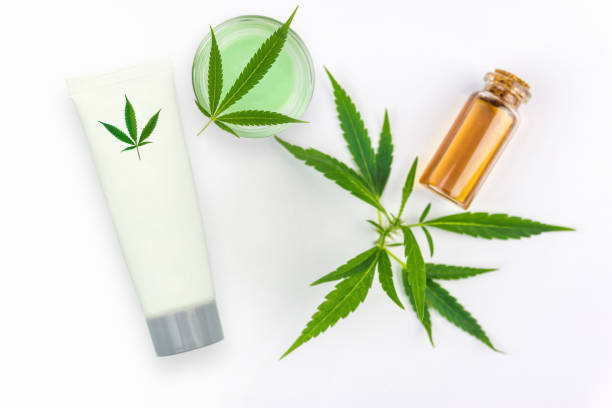
Hemp/CBD infused topicals. Photo credit: Envato.
CBD-infused topicals are one of the most effective ways for immediate relief of pain and inflammation. Cannabis itself can be very helpful to people who suffer from arthritis or other joint-related issues. Furthermore, CBD topicals can promote stress relief, especially when used to massage tense muscles.
But, when individuals use it on their face, topicals containing cannabis can also help treat conditions like acne and eczema. In fact, CBD can counteract the bacteria, Propionibacterium acnes, which causes acne and blemishes, reports Healthline.
How do Topicals Work?
Discover Magazine explains the science behind why CBD has so many benefits when applied directly to the skin in a topical solution. The body’s endocannabinoid system contains 2 receptors — CB1 and CB2 receptors — that can help control pain or itchiness. More specifically, the publication writes, “sidestepping the CB1 and CB2 receptors means that CBD can mute pain without the high sensation delivered by THC.”
Therefore, CBD-infused topicals may help mask joint pain or relieve itchiness from eczema or acne.
Words From an Expert
Cheri Sicard is a medical cannabis patient and cannabis cook who teaches others how to make their own infusions, including topicals, via her business Cannabis Cheri.
Aside from pain relief, Sicard states that “new studies, coupled with tons of anecdotal evidence, are beginning to reveal a host of other conditions that topical cannabis may help including, but not limited to, cancer.”
Additionally, she explains, topical cannabis products can help regulate immune responses in the skin, and have antioxidant, antibacterial, and analgesic properties.
Research published in The Journal of the Association of Basic Medical Sciences states that “CBD extracts may help to reduce cancer cell viability and prevent cancer cells from multiplying.”
The study adds that cannabinoids may help slow tumor growth, reduce tumor invasion by inducing cell death.
Furthermore, researchers with the National Cancer Institution (NCI) found that the cannabinoid receptor, CB2, might be a link connecting CBD and immunity.
Making One’s own
When it comes to making topicals, Sicard says that oils like coconut oil complement cannabis.
“[Coconut oil] is moisturizing, antibacterial, has a long shelf life and a pleasant scent.”
Sicard also notes that cannabis-infused topicals provide “localized as opposed to systemic relief.”
Localized diseases are those that only affect a specific part of the body, like one organ including the skin, according to the NCI. On the other hand, a systemic disease affects the entire body.
When applied locally, to a specific region, topical cannabis can provide fast-acting relief for irritated skin imbalances.
The customer education platform, CBD Oil Users, explains that when people make their own CBD-infused topicals, they can customize the product to their needs. For example, if someone has an allergy to certain ingredients, they can avoid purchasing a pre-made topical that includes the allergen by making the topical from scratch.
Another way that consumers can customize their product is for the benefits that they desire. Individuals can do this by adding terpene-rich formulas, like essential oils to recipes. For example, CBD Oil Users describes that “some users add limonene to help with sleep or beta-caryophyllene to aid in pain relief.”
Below are two DIY recipes that include coconut oil, as well as CBD.
DIY Recipes:
CBD Cream for Joint Pain:
JUSTCBD’s CBD-infused topical cream recipe targets pain and inflammation. With only six ingredients, this cream is a simple and all-natural way to help damaged joints.
Makes 1/2 cup
Start to finish: 20-25 minutes
4 ounces coconut oil
15-25 mg CBD
4 ounces Shea butter
4 tablespoon magnesium oil
10 drops camphor essential oil
10 drops peppermint essential oil
In a double boiler, combine coconut oil and Shea butter and turn off the heat. For those without a double broiler, use a heat-proof bowl in a saucepan filled with simmering water. Then, add magnesium oil and remove it from heat. Allow the mixture to cool before adding essential oils and CBD. Store in a container and apply as needed.
CBD Cream for Acne:
Cannadish has an incredible recipe for soothing persistent acne and redness. This simple recipe can be used daily to help with any skin troubles.
Makes 1 cup
Start to finish: 30 minutes
1/4 cup of raw organic Shea butter
1 teaspoon of vitamin C powder
2 teaspoons of rosehip seed oil
6 drops of tea tree essential oil
50 mg CBD Oil
6 drops of coconut essential oil
In a strong mason jar or double boiler, heat and melt the Shea butter until it is completely liquefied. Now take it off the heat. Once it has slightly cooled down, add the rest of the oils, followed by the vitamin C powder. Then mix thoroughly. Pour the mix into a clean, dry 4-ounce container and let it set in the refrigerator overnight.
*This article contains a sponsored partner



Using Hemp Seed oil for sunburn; no CBD 🙂